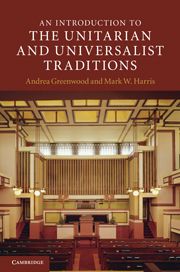Book contents
- Frontmatter
- Contents
- Acknowledgements
- A note on names
- Chapter 1 Introduction
- Chapter 2 Beginnings
- Chapter 3 Great Britain
- Chapter 4 From revelation to reason
- Chapter 5 From reason to intuition to freedom
- Chapter 6 A religion for one world
- Chapter 7 Congregational polity
- Chapter 8 Worship
- Chapter 9 Sources of faith
- Chapter 10 Science and ecology
- Chapter 11 Architecture, art, and music
- Chapter 12 Education and social justice
- Chapter 13 Current issues, new directions
- Selected bibliography
- Index
- References
Chapter 1 - Introduction
Published online by Cambridge University Press: 05 June 2012
- Frontmatter
- Contents
- Acknowledgements
- A note on names
- Chapter 1 Introduction
- Chapter 2 Beginnings
- Chapter 3 Great Britain
- Chapter 4 From revelation to reason
- Chapter 5 From reason to intuition to freedom
- Chapter 6 A religion for one world
- Chapter 7 Congregational polity
- Chapter 8 Worship
- Chapter 9 Sources of faith
- Chapter 10 Science and ecology
- Chapter 11 Architecture, art, and music
- Chapter 12 Education and social justice
- Chapter 13 Current issues, new directions
- Selected bibliography
- Index
- References
Summary
Once there were three men who were in the same book club, and also of different faiths. Michael, George, and Francis – or Miguel, Giorgio, and Ferencz – had very different backgrounds, spoke different languages, practiced different professions. Like us, they lived in an era when technology completely changed how information spread. For us it is the digital age and globalization; for them, half a millennium ago, it was the printing press, and the establishment of trans-Atlantic trade routes. Their book club was centered permanently on one book – the Bible; but because of the printing press, that Book could be studied outside of monasteries and in several languages. People began to read the words themselves. The atmosphere for discussion grew much larger. It was everywhere. It was not necessary to actually attend religious services to be heavily involved in the dialogue. Miguel Servetus, who trained as a lawyer and also worked as a cartographer, noticed that there was no trinity in the Bible, and he wrote about this, advocating for unitarian understandings of God. His books were banned.
- Type
- Chapter
- Information
- Publisher: Cambridge University PressPrint publication year: 2011

